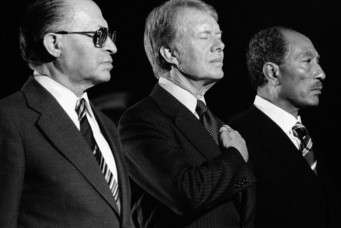Witnesses of Peace
How did the insiders and diplomats who witnessed the Camp David proceedings experience those events?

President Jimmy Carter, Egypt’s Anwar Sadat, and Israel’s Menachem Begin celebrate the signing of the Egyptian–Israeli peace treaty, Washington D.C., March 26, 1979. Warren K. Leffler/Library of Congress
In 1978, Jimmy Carter initiated the Camp David summit as an attempt to put an end to the longstanding Arab–Israeli conflict. The result was direct negotiations between Egyptian President Anwar Sadat and Israeli Prime Minister Menachem Begin. Hailed as peacemakers, Sadat and Begin jointly won the Nobel Peace Prize for their roles in the treaty, but it was not easy. Thirteen days of secret negotiations at the Camp David retreat in the wooded hills of Catoctin Mountain Park near Maryland produced everything from suspicion to boycotts to unfulfilled promises. How did the insiders and diplomats who witnessed the Camp David proceedings experience those events?
As Carter’s Middle East advisor, William Quandt said at a talk at the American University in Cairo that Carter realized early on that the only way to break the political deadlock was to bring Begin and Sadat to the negotiating table. Subsequently, Quandt flew to Israel to invite Begin to the talks. However, Begin was highly suspicious, Quandt said, because he knew that Carter had a good personal relationship with Sadat and was closer to the Egyptian position, especially on issues of borders, East Jerusalem, and the West Bank, than the Israeli one.
When both leaders finally met on September 6, 1978—the second day of the Camp David talks—Carter genuinely believed that “Sadat will be generous in his commitment to peace [and] Begin will recognize that he needs to return Egyptian territory,” Quandt remembered Carter saying. Carter’s plan was to get Begin and Sadat to talk face to face and for him to act as a facilitator. “That model completely failed within the first day,” Quandt said. Sadat brought an Egyptian proposal that he insisted on reading out loud. According to Quandt, “Begin went crazy. Carter’s job was to keep Begin from interrupting.” Sadat and Begin did not sit together again till the end of negotiations, and Carter acted as a go-between.
Reconciling both sides was an arduous task: Begin took a hard-line position on most issues, especially concerning returning territories Israel had seized in the West Bank and the Palestinians’ demands for an autonomous, sovereign state. “Every time we tried to put in something that was tangible, Begin wouldn’t accept it and we would have to water it down,” explained Quandt. The structure of the talks shifted when the Israeli attorney general, in an attempt to dodge another intransigent Israeli proposal, suggested to Quandt that Carter’s counsel write up a draft of their own to be used as a basis for negotiations. Twenty-three drafts later, the accords were signed.
But one point went amiss: Begin promised Carter he would make a decision about whether or not to stop settlement construction in the occupied West Bank territories—a cursory remark that Carter understood as a promise for a complete settlement freeze. Quandt admitted that a huge U.S. failure was convincing both parties to sign the accords before the Americans could verify that commitment.
On Egypt’s negotiating team, Nabil Elaraby, who was present as a legal advisor, agreed with Quandt that the accords could have gone better. He stated that Israel’s reluctance to budge on any of their conditions made it impossible to negotiate just and sustainable peace accords. “The Camp David documents were definitely inadequate, but Israel managed to frustrate all attempts to carry out whatever was left of it,” he maintained.
According to Elaraby, toward the end of the negotiations, the problem was as much what Israel didn’t say as what it did. Elaraby explained how on the last day of Camp David he tried to convince Sadat not to leave the accords with so many loose ends.
Elaraby raised three main concerns with Sadat. First, he was worried that there was no mention in the document about removing the settlements from the regained Sinai Peninsula. He was also opposed to the document containing references to Palestinian self-determination and future. “From a legal point of view, we are the third party; we cannot accept for the Palestinians what they do not accept,” Elaraby explained.
Elaraby also wanted clarity on the issue of sovereignty over Jerusalem. He recounted how Sadat refused to listen to his critiques, “He said, ‘you look at the trees while I look at the forest.’” As a result, the accords went through unchanged and the only result was that the Egyptian foreign ministry made the unanimous decision to boycott the assembly signing.
Ultimately, the outcomes of the accords did not achieve all that Carter had hoped. From 1977 to 1981, the number of settlements in the occupied West Bank increased. Egypt was suspended from the Arab League, and war broke out in southern Lebanon. While Camp David brought tacit peace between two nations, it did not address many issues that were at the root of the conflict between Egypt and Israel.
Both speakers blamed Sadat and Begin for the failure of the talks to establish a lasting peace in the region. Quandt stressed this fact, noting that while the outline for Egyptian–Israeli peace was a significant achievement, much of the “tortured prose” that resulted from the thirteen days was not worth the effort that went into trying to get Begin and Sadat to agree. “We should have been more honest about what we had achieved, and I think the backlash against it would have been no more than what we already got in the Arab World.”
Subscribe to Our Newsletter





